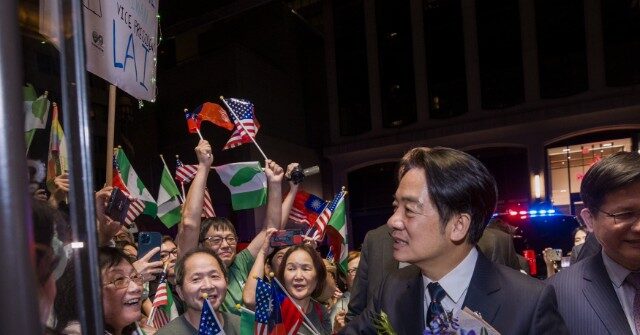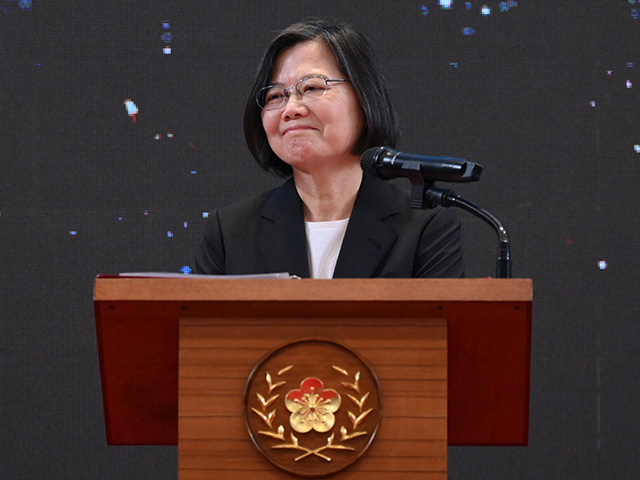Top News
China Fumes over ‘Despicable’ Taiwan Vice President’s Warm Welcome in NYC

Taiwanese Vice President William Lai received a warm welcome in New York this weekend on a stopover to Paraguay, prompting an irate Chinese Communist Party to threaten the White House with “resolute and strong measures” in response to giving Lai, a “troublemaker” and “betrayer,” entry to the country.
Lai, the frontrunner in Taiwan’s upcoming presidential election in January, is leading a delegation to Paraguay for the inauguration of President-elect Santiago Peña on Tuesday. Paraguay is one of a dwindling number of countries that recognizes Taiwan’s sovereignty and the only one left in South America. Communist China refuses to maintain diplomatic relations with any country that acknowledges the existence of the country of Taiwan and offers significant financial incentives to sway away those who do, leaving Taipei with few formal diplomatic outposts around the world. China’s most recent successes in the region have been the swaying of the governments of Honduras and El Salvador to abandon Taiwan.
America does not recognize Taiwan as a state. It does, however, sell weapons and maintain other critical trade with Taipei. Taiwanese politicians also regularly visit the country in unofficial capacities, often for “stopovers” on the way to allied states such as Lai’s this weekend.
RELATED: Biden’s Secretary of State Blinken Says, “We Do Not Support Taiwan Independence” While Visiting China
U.S. Department of State
Lai landed in New York City on Saturday, greeted by Taiwanese Americans and supporters. A pro-Taiwan crowd also assembled in front of the Lotte New York Palace Hotel in Manhattan to greet him, an enthusiastic rejection of China in a city where prosecutors accused Beijing of operating an illegal police station to intimidate anti-communist dissidents:
The Taipei Times, citing sources familiar with Lai’s itinerary, said that he would keep his stopover in New York “low-key” and not meet with American politicians, a move that typically prompts heightened displays of Chinese government outrage. His major engagement was an address at a banquet hosted in his honor on Sunday, where he delivered a speech on Taiwan’s shared values with America:
I was delighted to see so many friends at our lunch banquet in NYC today. What an amazing crowd! My thanks to @BoardChairAIT for her video greeting and AIT/W Managing Director Ingrid Larson for joining us today. https://t.co/GJpk6cO4jf
— 賴清德Lai Ching-te (@ChingteLai) August 13, 2023
“Vice President Lai emphasized that we stand up for our values of freedom and democracy and do not fear or shrink from the threat of authoritarianism, no matter how big it is,” the Taiwanese government relayed in a press summary of his remarks. “The vice president further stressed that Taiwan’s belief in democracy acts as a shining beacon for those in the Indo-Pacific region striving for democracy, freedom, and human rights.”
Lai also noted Taiwan’s support for Ukraine in response to the Russian invasion of that country, noting that Taiwan has “deployed medical teams, sent aid in the forms of funds, manpower, and supplies, and some of our citizens even joined the fight for Ukraine on their own initiative.”
“We will not let any democracy fight alone, he stressed, and for this we have gained the recognition of the global democratic community,” according to the Taiwanese government.
On Sunday, the Chinese Foreign Ministry issued a statement sternly condemning Lai’s presence in America.
“Lai Ching-te clings stubbornly to the separatist position for ‘Taiwan independence’: He is a troublemaker through and through,” the Chinese Foreign Ministry proclaimed. “The US and the Taiwan authorities arranged for Lai to engage in political activities in the US in the name of having a ‘stopover.’ This seriously violates the one-China principle, gravely undermines China’s sovereignty and territorial integrity.”
The Foreign Ministry demanded that America “stop all forms of official interaction with Taiwan,” stop “supporting” Taiwan’s independence (which America doesn’t recognize), and threatened “resolute and strong measures to safeguard its sovereignty and territorial integrity.”
Chinese Foreign Minister Wang Yi addresses a joint press conference with the German foreign minister after talks on February 13, 2020, at the German Foreign Ministry’s Villa Borsig in North Berlin (JOHN MACDOUGALL/AFP via Getty Images).
China claims Taiwan is a province rightfully under the control of Beijing and claims any recognition of the reality of Taiwan’s statehood is a threat to China’s “sovereignty, ” despite Taiwan being a sovereign nation with a fully independent government, military, and state infrastructure.
The Chinese state-controlled Global Times newspaper further disparaged Lai in a series of columns throughout the weekend. On Monday, the newspaper condemned Lai as “arrogant,” “radical,” and “a betrayer who has forgotten his roots.” The government outlet described Lai’s travel to America as “despicable” and all similar visits as “a touch on the red line and a provocation to all compatriots on both sides of the Taiwan Straits who are committed to peaceful reunification.”
The Taiwanese government rejects the term “reunification” to describe Chinese colonization of Taiwan, as Taiwan has never in its history been ruled by a government headquartered in Beijing.
In a separate article published on Sunday, the Global Times cited alleged “experts” to warn that America “should understand that Lai and Taiwan separatists like him are the troublemakers that could bring danger to the US, and they are the risks that could cause China-US ties to get out of control.”
“The US needs to take concrete actions to prevent the danger from happening rather than sending wrong signals to encourage or tolerate Taiwan separatists’ activities, experts said,” the newspaper claimed.
Lai, who serves as vice president under current term-limited President Tsai Ing-wen, is the leader in most recent Taiwanese presidential election polls.

Taiwan’s President Tsai Ing-wen speaks during a press conference on the seventh anniversary of her tenure, at the Presidential Office in Taipei on May 20, 2023 (SAM YEH/AFP via Getty Images).
A poll by the Taiwanese Public Opinion Foundation from June found him obtaining 36.5 percent support, the largest share of the vote among candidates. Third-party candidate Ko Wen-je, the former mayor of Taipei, came in second place with 29.1 percent – a surprise outcome – with China-friendly Kuomintang candidate Hou Yu-ih coming in third with 20.4 percent support.
Follow Frances Martel on Facebook and Twitter.
Read the full article here


















